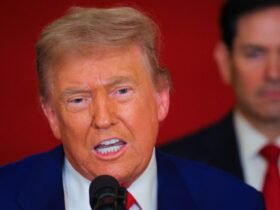Health Secretary Robert F. Kennedy Jr. dismissed increased screening and understanding of autism for the rising rate of autism diagnoses in the U.S., instead directly blaming “environmental toxins” for the increase.
“This is a preventable disease. We know that it’s an environmental exposure. It has to be. Genes do not cause epidemics,” he told reporters Wednesday while promoting a federal study he’s ordered into the condition, which he has said will determine autism’s cause by September.
“We have to recognize, we are doing this to our children and we need to put an end to it,” he said.
Kennedy’s message follows the Centers for Disease Control and Prevention releasing a report on Tuesday that found that about one in every 31 children was diagnosed with autism by age 8 in 2022, up from one in 36 in 2020.
Researchers have been studying autism spectrum disorder (ASD) for decades and have not determined a cause. The CDC’s study cited a range of different potential reasons for the rise in diagnosis, however, including disparities in access to early autism therapies, families’ differing socioeconomic statuses, and higher rates of intellectual disability among preterm births. The study also noted that autism evaluations and identifications among children dropped at the start of the COVID-19 pandemic. These evaluations and identifications resumed to their prior levels by early 2022.
There’s no evidence that “living in certain communities puts children at greater risk for developing ASD,” the study concluded. “Differences in the prevalence of children identified with ASD across communities might be due to differences in availability of services for early detection and evaluation and diagnostic practices.”
Kennedy, however, called it a “canard” to blame the increase on “better diagnosis, better recognition or changing diagnostic criteria,” as other medical experts have done.
Doctors in the past, when autism diagnoses were significantly lower than they are today, “weren’t stupid. They weren’t missing all these cases,” he said.
He also dismissed researchers pointing to genetics as possibly playing a major role. The National Institutes of Health states on its website that “more than 100 genes on different chromosomes may be involved in causing ASD, to different degrees.”
“This is coming from an environmental toxin and somebody made a profit by putting that environmental toxin in our air, our water, our medicines, our food.”
“Genetic markers alone are not going to dictate your destiny. You need an environmental toxin,” Kennedy said of the link between genetic mutations and autism.
“This is coming from an environmental toxin, and somebody made a profit by putting that environmental toxin in our air, our water, our medicines, our food. And it’s to their benefit to say, to normalize it, to say all this is all normal, it’s always been here,” he insisted.
Kennedy said that within two to three weeks, his department would announce a series of new studies to “identify precisely what environmental toxins are causing it.”
He said researchers will examine everything from food additives, mold, water, medicines and ultrasounds.
Dr. Walter M. Zahorodny, an associate professor at Rutgers who has overseen public monitoring of autism in New Jersey and was part of the CDC’s study, also spoke alongside Kennedy and said that “there’s better recognition of autism and better awareness because there are more children with autism.”
We Don’t Work For Billionaires. We Work For You.
Support JS
Already contributed? Log in to hide these messages.
“Autism went from being a very unusual, rare disability, which affected, as the secretary said, one child in maybe 10,000, to being known in every community, every school district,” he said.
Zahorodny urged “a correct perception” of the condition, saying it’s something extremely serious, “that we don’t understand, and it must be triggered or caused by environmental or risk factors.”













Leave a Reply